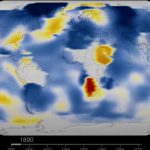NASA Science Live: Climate Edition – Rising Heat
NASA Science Live: Climate Edition – Rising Heat
From soaring temperatures affecting agriculture and the ocean, to the escalating frequency and intensity of heat waves. And the challenges posed by rising temperatures across our planet’s interconnected systems have far-reaching impacts.
Overall, Earth was about 2.45 degrees Fahrenheit (or about 1.36 degrees Celsius) warmer in 2023 than in the late 19th-century (1850-1900) preindustrial average.
Earth-orbiting satellites and new technologies have helped scientists see the big picture, collecting many different types of information about our planet and its climate all over the world. These data, collected over many years, reveal the signs and patterns of a changing climate.
Join NASA Chief Scientist and Senior Climate Advisor Kate Calvin for this special edition of NASA Science Live, where she will be joined by experts to dive into the connection between Earth’s climate system and people.
More – Last year NASa had this warning – Summer of 2023 was Earth’s hottest since global records began in 1880, according to scientists at NASA’s Goddard Institute of Space Studies (GISS) in New York.
#ynuktv
Thumbnail: NASA
Connect
Subscribe for latest videos and live streams
On the go – key in ynuk.tv
Your reaction – drop by our comment box
Follow our socials:
facebook: @YNUKtv
twitter: @YourNewsUKtv
instagram: @yournewsuktv
Is Earth Getting Hotter? #NASA scientists talk data from earth-orbiting satellites watch LIVE https://t.co/MdrnQeTMfl NASA warned summer of 2023 was hottest since records began 1880, this year? #risingheat #globalwarming #environment #ynuktv pic.twitter.com/NoxC8WeCwG
— YourNewsUKtv (@YourNewsUKtv) June 28, 2024








